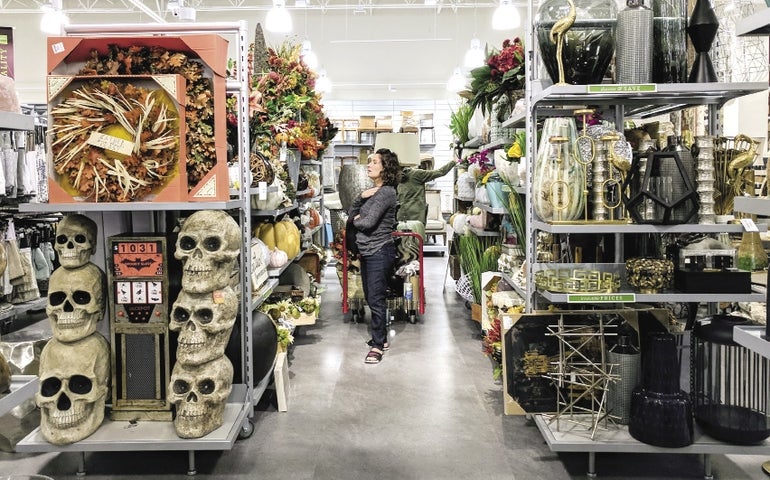HomeSense is TJX's new bet on retail
 Photo | Grant Welker
HomeSense offers decor like seasonal decorations as a HomeGoods does, but also includes large furniture and lighting.
Photo | Grant Welker
HomeSense offers decor like seasonal decorations as a HomeGoods does, but also includes large furniture and lighting.
TJX Cos. has for years been a rare bright spot in retailing, earning high margins and opening stores as many competitors have shuttered one store after another.
Now, the MetroWest company is placing a wager it can keep the streak of success going, launching a new home decor and furniture chain, HomeSense. The move reflects the company's confidence about the room for growth in the industry, its ability to leverage customer loyalty and use existing supply and distribution network to keep costs down.
“We believe we are significantly underpenetrated in the total U.S. home market, and enormous opportunity remains for us to gain share in this space,” said Scott Goldenberg, TJX CFO and senior executive vice president, in an earnings call with investors in May, when HomeSense was announced.
TJX, with $33 billion in annual revenues and corporate offices in Framingham and Marlborough, plans to add 260 stores this year, including nearly 100 HomeGoods.
HomeSense & HomeGoods
HomeSense will be different from the TJX's existing and similarly named HomeGoods chain. CEO Ernie Hermann described an extreme, visible difference, with the new chain having more lighting and art, and large furniture such as sofas and bookcases. A general store-themed part of each HomeSense will carry organization and hardware items.
HomeGoods, which already has more than 600 stores in the United States, will be the only one of the two lines to carry kids and pet items.
“HomeSense will look and feel very different from our HomeGoods chain,” Goldenberg said.
In fact, TJX is planning to have HomeSense and HomeGoods near one another or even sometimes in the same plaza. The first HomeSense store, which opened in August at Shoppers World in Framingham, is just across Route 30 from a HomeGoods. Two other HomeSense stores slated to open this fall are within a mile from a HomeGoods store, and another is in the same plaza.
The Framingham HomeSense was packed in the middle of a weekday this month. To a typical shopper, there may seem to be little difference between a HomeGoods store and this new store, though HomeSense has a brighter, modern-design, warehouse feel.
“It'll be interesting to see how it plays out, because HomeGoods is such a hit,” said Isaura Beltre, a marketing professor at Bentley University in Waltham, who expressed confidence in both chains succeeding because of quality products, low prices, and lower leasing costs for TJX in cheaper retail plazas.
A $664B market
TJX has exploited shoppers' desire to find something unexpected when they visit a store, said Lauren Beitelspacher, an assistant marketing professor at Babson College in Wellesley.
“They're trying to leverage that loyalty,” she said of the new chain.
“Given how effective they are with their current chains, I think there's every reason to think they'll be successful,” said Frank Hoy, a business professor at Worcester Polytechnic Institute.
The home-decor market is expanding beyond just TJX.
Texas retailer At Home, for example, has 125 stores today — up from 81 in October 2014 — and says it foresees long-term growth to at least 600 stores. The international home decor industry is projected to grow by 4.2 percent through 2020, reaching $664 billion, according to the analyst group Research and Markets of Ireland.
TJX's foray further into the sector will shake up the furniture market significantly, said Farla Efros, the president of HRC Retail Advisory, a Chicago-area firm.
For TJX, the home market offers better profit margins than retail, and includes the loyal customer base other furniture stores don't have, Efros said.
TJX believes it can draw shoppers into stores instead of buying online by having what Hermann called “one of the most impulsive treasure-hunt experiences.”
That sense of discovery is important to customers, Beitelspacher said. Many still like brick-and-mortar stores, she said, “and they want to be wowed.”












0 Comments